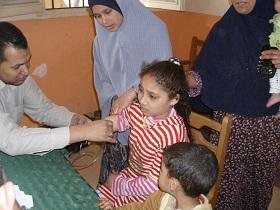Using AI to control energy for indoor agriculture
30 September 2024
Published online 18 April 2013

Leading the push for a more preventative approach to stop the Hepatitis C epidemic in Egypt is Mohamed Edrees, the health programme manager at the NGO Misr el-Kheir, who claims that poor clinical standards are contributing to the rising number of infections.
Edrees cites examples of doctors using endoscopes on successive patients after merely rinsing the instruments in tap water. "[The endoscope] needs to be cleaned for up to 25 to 30 minutes," he says, "but they use it right away and they use it for dozens of patients an hour."
Edrees says that in the past five years, the government has spent US$500 million on HCV treatment, but neglected prevention, suggesting that 10% of the government's annual expenditure on HCV could "go to prevention and stop transmission completely."
Along with regulation and certification of safety practices at hospitals, Misr el-Kheir wants to help them acquire new equipment. It also calls for a community awareness programme.
"People are asking us, 'What can we do to protect ourselves?' They should go to a better facility, make sure that the doctor is washing his hands and make sure that the equipment they are using is not being used on someone else," explains Edrees.
Misr el-Kheir also provides doctors with "paradigm shift training", steering them away from unsafe practices. "We've developed this programme so that everyone knows their first priority is to do no harm to the patient," says Edrees.
Edrees's aims are echoed by Mohamed Zaazoue, a neurosurgeon and the head of the public health NGO Healthy Egyptians. His organization hopes to bring "continuous and sustainable" health education to society as a whole, making people aware of infection issues from a young age.
"The problem isn't the current pool, it's the addition of people to the pool," he says. "People should care more about health education. When you have a quarter of your population suffering from [HCV], it's worth it to spend a few million pounds raising awareness."
Some people have to travel for at least two hours every week for treatment.
But even as Zaazoue, Edrees and others push for a preventative approach, the scale of the epidemic, combined with the expensive treatment and Egypt's high poverty rates, means access to treatment is also a problem.
Sameh Kirollos, medical coordinator assistant with Médecins Sans Frontières' (MSF) Egypt office, says that 53% of Egyptians infected with the disease are unable pay for treatment, leaving the government to bear the cost.
Despite 24 state-run specialized treatment centres nationwide, some patients fall through the cracks. To catch such patients, MSF is setting up clinics for those who live far from government treatment centres.
The head of mission in Egypt for MSF, Julien Raickman, says the end goal is to create an expanded treatment model that the Ministry of Health can duplicate.
"Some people have to travel for at least two hours every week for treatment," Raickman says. "In the rural areas, it's often difficult to access treatment for the people who are eligible for it at state expense."
The logistics of a treatment-based approach to HCV are exacerbated, points out Raickman, by the intensive nature of the treatment itself. "The side effects are [serious], and a high-quality level of care requires a lot of follow-up," he says.
The prolonged treatment regimen takes 72 weeks, including tests, and involves a weekly injection and a daily capsule dose. The medication requires close supervision, and only has a 60-65% success rate for HCV genotype 4, which predominates in Egypt.
The price of the treatment is also an issue, and Kirollos and Raickman confirm that MSF is also lobbying for the World Health Organization to include Ribavirin and Interferon – the antiviral drugs commonly used in treating HCV – on its list of "essential medicines," which would bring down the drugs' price and ease the government's burden.
When you have a quarter of your population suffering from [HCV], it's worth it to spend a few million pounds raising awareness.
Another aim is to reach infected patients before their liver is permanently damaged. Hepatologist Mohamed Abdel Moneim , says 95% of the patients he sees at the 6 October Hospital in Cairo, are already in this chronic phase, beyond the reach of normal anti-viral therapy. The only remaining option is either a liver transplant or liver support, which he refers to as "functional therapy" to maintain a decent quality of life.
Though he says liver transplants are effective for many patients, Abdel Moneim emphasizes the need "to cut the cycle in the beginning" – to stop the infection from happening in the first place.
Zaazoue says that the current government's total health spending remains the same as it was before the popular uprising which ousted past president Mubarak. "They say they can't increase expenditures because they can't give more money, but people aren't asking for more money; they're asking for a certain percentage of the GDP [to] be reallocated in the total budget."
By maintaining the status quo in health expenditures, the government-funded treatment approach to HCV will go on, and may possibly expand if it takes over MSF's decentralized clinics. Unless the crisis is approached in a preventative way, the need for an expensive wide-scale treatment regime will remain.
But advocates for prevention remain determined to keep more Egyptians from being infected. "Five of my close friends have died from HCV and liver cancer," says Edrees. "I've seen people die every day and too much money spent on this malpractice."
doi:10.1038/nmiddleeast.2013.58
Stay connected: